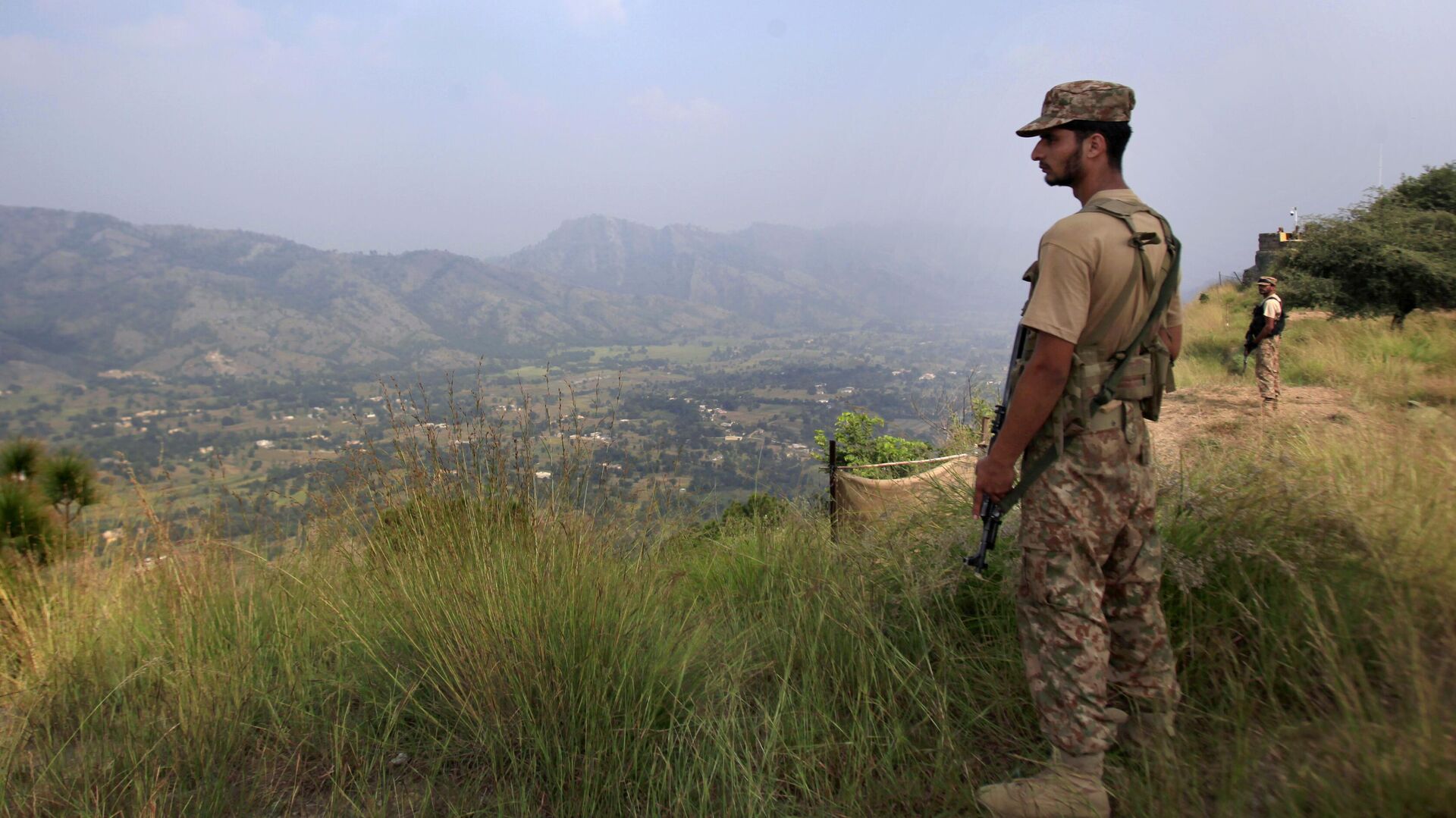https://sputniknews.in/20221213/indian-security-officials-cautious-about-developments-in-pakistan-35552.html
Indian Security Officials Cautious About Developments in Pakistan
Indian Security Officials Cautious About Developments in Pakistan
Sputnik India
Senior security officials observing Kashmir told Sputnik that the Western backing of Pakistan might complicate relations between the two nuclear powers. 13.12.2022, Sputnik India
2022-12-13T07:04+0530
2022-12-13T07:04+0530
2022-12-22T19:11+0530
south asia
narendra modi
bharatiya janata party (bjp)
pakistan
sputnik opinion
https://cdn1.img.sputniknews.in/img/07e6/0c/0c/38884_0:82:3353:1968_1920x0_80_0_0_c961f0ebccdb51ca070aa9a74821dcb0.jpg
With the Pakistani Army’s image taking a hit in the ongoing political tussle between former Prime Minister Imran Khan and the current coalition government in Pakistan, the appointment of Asim Muneer as chief of Army Staff is being viewed cautiously by the security establishment in India.Senior government officials from New Delhi and Kashmir, where Islamabad has been suspected of backing a separatist insurgency, believe that the Pakistani Army's posture could become a matter of concern for India in terms of providing moral and logistical support to the militancy in the region, which will enter its 34th year in 2023.Munir, a four-star lieutenant general in the Pakistani Army, served at the General Headquarters in Rawalpindi before being appointed to the powerful post of Pakistan’s army chief three weeks ago.The global terror-financing watchdog removed Pakistan from its grey list in October, concluding that Islamabad had fully excised policies against anti-money laundering and terror financing.“The FATF is a consensus driven body and clearly the West, after NATO’s departure from Afghanistan, has warmed up to Pakistan, which was having a rough relationship with the United States. With the FATF deterrent gone, what is stopping Pakistan?” the official asked.A senior police officer in Kashmir expressed similar views, attributing global attention to Islamophobia to an increase in Pakistan’s soft power: according to him, Islamist insurgencies across the world are not the same as they were 20 years ago, as “Islamophobia is being recognized as a mainstream issue” now.“In the backdrop of this change, Pakistani establishments standing on Kashmir may not find as much resistance as they would have post-Twin Tower attacks. I believe that the time between the spring of 2023 till the general elections are held in both India and Pakistan will be decisive. This period will tell us what the next decade will look like in South Asia and in Kashmir,” the officer added.There is, of course, another view.Former Pakistan PM Imran Khan has repeatedly accused the United States of orchestrating a regime change in his country, while several prominent supporters of Khan's party slammed former Pakistani Army chief Q.J. Bajwa for supporting his ouster. With the current army chief just three weeks in office, a number of security experts in India believe it is still too early to identify what kind of relationship Khan shares with the army, if he eventually makes his way back into office, given his significant supporter base.Deependra Singh Hooda, former general officer commanding-in-chief of the Indian Army's Northern Command, said the priority of the Pakistani Army and that of its chief would be an image makeover rather than destabilizing its eastern borders with India.“The security and political situation with India and Pakistan are likely to remain the same. Besides the issues of image the Pakistan Army is facing due to its political involvement, the broken ceasefire with Tehreek-i-Taliban and the tussle with the Taliban at the Durand line is something that Pakistan will prioritize over Kashmir. At least ideally that is what it should do. With regards to politics, I think the political and economic instability in Pakistan will deter India from having any serious talks with the current Pakistani government, because there will always be fear that any bilateral decisions taken under the current dispensation in the country can be reversed if Imran Khan comes back to power,” said Hooda.A former federal government official who handled Pakistani affairs during his service seems to be more optimistic.“Kashmiris were not in favor of Pakistan in the 1947 division of the Indian subcontinent. But when militancy started in Kashmir, this changed. The tide has again changed now. When in 2019, India revoked the special status of Kashmir, many there were annoyed. Now the situation is getting normalized. Anger is getting pacified. One great example is that there are hardly any replacements that militant groups are finding for its militant commanders who are getting killed. Pakistan still has the capacity to change the tide, but if they won’t find any Kashmiris to do their bidding, the situation will turn in our favor,” the official explained.The views and opinions expressed in this article are those of the experts and do not necessarily reflect the position of Sputnik.
south asia
pakistan
Sputnik India
feedback.hindi@sputniknews.com
+74956456601
MIA „Rossiya Segodnya“
2022
Azaan Javaid
https://cdn1.img.sputniknews.in/img/07e6/0c/08/19280_0:0:1080:1080_100x100_80_0_0_d0f3f10ac6f30fb5b9e5e21a5e2536ea.jpg
Azaan Javaid
https://cdn1.img.sputniknews.in/img/07e6/0c/08/19280_0:0:1080:1080_100x100_80_0_0_d0f3f10ac6f30fb5b9e5e21a5e2536ea.jpg
News
en_IN
Sputnik India
feedback.hindi@sputniknews.com
+74956456601
MIA „Rossiya Segodnya“
Sputnik India
feedback.hindi@sputniknews.com
+74956456601
MIA „Rossiya Segodnya“
Azaan Javaid
https://cdn1.img.sputniknews.in/img/07e6/0c/08/19280_0:0:1080:1080_100x100_80_0_0_d0f3f10ac6f30fb5b9e5e21a5e2536ea.jpg
south asia, narendra modi, bharatiya janata party (bjp), pakistan
south asia, narendra modi, bharatiya janata party (bjp), pakistan
Indian Security Officials Cautious About Developments in Pakistan
07:04 13.12.2022 (Updated: 19:11 22.12.2022) Senior security officials observing Kashmir told Sputnik that the Western backing of Pakistan might complicate relations between the two nuclear powers.
With the Pakistani Army’s image taking a hit in the ongoing political tussle between former Prime Minister Imran Khan and the current coalition government in Pakistan, the appointment of Asim Muneer as chief of Army Staff is being viewed cautiously by the security establishment in India.
Senior government officials from New Delhi and Kashmir, where Islamabad has been suspected of backing a separatist insurgency, believe that the Pakistani Army's posture could become a matter of concern for India in terms of providing moral and logistical support to the militancy in the region, which will enter its 34th year in 2023.
Munir, a four-star lieutenant general in the Pakistani Army, served at the General Headquarters in Rawalpindi before being appointed to the powerful post of Pakistan’s army chief three weeks ago.
“What we have been noticing is that Pakistan has increased its backing of insurgents in Kashmir ever since there were talks of the Financial Action Task Force (FATF) removing the country from its grey list,” a senior federal security official told Sputnik, requesting anonymity.
The global terror-financing watchdog removed Pakistan from its grey list in October, concluding that Islamabad had fully excised policies against anti-money laundering and terror financing.
“The FATF is a consensus driven body and clearly the West, after NATO’s departure from Afghanistan, has warmed up to Pakistan, which was having a rough relationship with the United States. With the FATF deterrent gone, what is stopping Pakistan?” the official asked.
A senior police officer in Kashmir expressed similar views, attributing global attention to Islamophobia to an increase in Pakistan’s soft power: according to him, Islamist insurgencies across the world are not the same as they were 20 years ago, as “Islamophobia is being recognized as a mainstream issue” now.
“Naturally, recruitment for Islamist militancy would see a decrease if political engagements and resolutions are introduced to [tackle] issues [radicals] use to fuel terrorism. Muslim sports personalities, celebrities, politicians wearing their identity on their sleeves are getting more acceptance globally, and several places that have benefited from this image change include Saudi Arabia, Palestine, Pakistan, Syria, Qatar,” the officer said.
“In the backdrop of this change, Pakistani establishments standing on Kashmir may not find as much resistance as they would have post-Twin Tower attacks. I believe that the time between the spring of 2023 till the general elections are held in both India and Pakistan will be decisive. This period will tell us what the next decade will look like in South Asia and in Kashmir,” the officer added.
There is, of course, another view.
Former Pakistan PM Imran Khan has repeatedly accused the United States of orchestrating a regime change in his country, while several prominent supporters of Khan's party slammed former Pakistani Army chief Q.J. Bajwa for supporting his ouster. With the current army chief just three weeks in office, a number of security experts in India believe it is still too early to identify what kind of relationship Khan shares with the army, if he eventually makes his way back into office, given his significant supporter base.
Deependra Singh Hooda, former general officer commanding-in-chief of the Indian Army's Northern Command, said the priority of the Pakistani Army and that of its chief would be an image makeover rather than destabilizing its eastern borders with India.
“The security and political situation with India and Pakistan are likely to remain the same. Besides the issues of image the Pakistan Army is facing due to its political involvement, the broken ceasefire with Tehreek-i-Taliban and the tussle with the Taliban at the Durand line is something that Pakistan will prioritize over Kashmir. At least ideally that is what it should do. With regards to politics, I think the political and economic instability in Pakistan will deter India from having any serious talks with the current Pakistani government, because there will always be fear that any bilateral decisions taken under the current dispensation in the country can be reversed if Imran Khan comes back to power,” said Hooda.
A former federal government official who handled Pakistani affairs during his service seems to be more optimistic.
“There are three factors that suggest that Pakistan will not be able to escalate the insurgency in Kashmir to the levels that we saw in the 1990s and 2000s. One is international pressure, second its domestic crisis, but more important is the Kashmiri, who is the fulcrum in all of this,” he believes.
“Kashmiris were not in favor of Pakistan in the 1947 division of the Indian subcontinent. But when militancy started in Kashmir, this changed. The tide has again changed now. When in 2019, India revoked the special status of Kashmir, many there were annoyed. Now the situation is getting normalized. Anger is getting pacified. One great example is that there are hardly any replacements that militant groups are finding for its militant commanders who are getting killed. Pakistan still has the capacity to change the tide, but if they won’t find any Kashmiris to do their bidding, the situation will turn in our favor,” the official explained.
The views and opinions expressed in this article are those of the experts and do not necessarily reflect the position of Sputnik.


